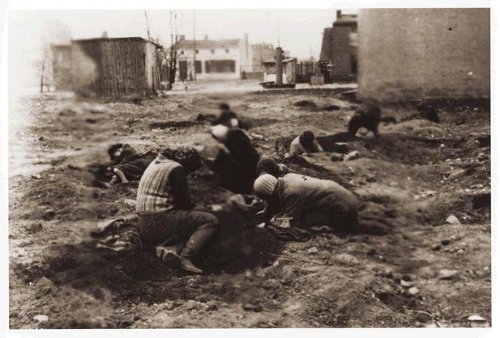
In July 1945, a former inhabitant of Poland’s Lódz ghetto, Avraham Benkel, returned to find his home in ruins. Lódz had been the last of 200 ghettos in German-occupied Poland, and as the war neared its conclusion tens of thousands of its inhabitants had been deported to death camps. When the Red Army reached it in January, only 877 survivors remained.
In the abandoned building next door to his own, Benkel found a book, François Coppée’s The Truly Rich, on whose endpages and margins an anonymous boy had kept a diary of his ordeal:
June 1, 1944: “I just finished my ‘loaf, which I had to have for eight days; today is the third. It may turn [out] to be lethal for me to behave in such a manner, but my will-power is so weakened and my ever increasing appetite so strong that I can’t help it. Is there no bread, dry unsavoury bread enough for me and my fellow-sufferers in this world?”
July 10, 1944: “I am exhausted, I have no more patience, my nerves are frayed. What I do have is an indescribable disgust toward the world and mankind, toward the masses and people, toward doctrines and dogmas. I do not believe, I do not believe in any change in the world, no! Anyone who can sink as low as the modern man has can be nothing more than an unsuccessful experiment of nature, which certainly regrets it!”
July 20, 1944: “I feel such a need to open my diary and to write in order to ease my bitter heart, about what hell we go through, how terribly we suffer. During the time when we had literally nothing to eat, we were willing to believe that the physical annihilation of men, women, and children of our nation had appeased the blond beast. But now it looks as if they have not had enough, and that they want to satisfy their thirst with the blood of the innocent.”
Almost nothing is known about the boy’s identity, age, background, schooling, or fate. Only the verb forms in his entries tell us that he was male. In all likelihood he was deported to Auschwitz as the Russians closed in.
“My God, why do you allow them to say that you are neutral?” he wrote in a final, undated entry. “Why will you not punish, with all your wrath, those who are destroying us? Are we the sinners and they the righteous? Is that the truth? Surely you are intelligent enough to understand that is it not so, that we are not the sinners and they are not the Messiah!”
(From Alexandra Zapruder, Salvaged Pages: Young Writers’ Diaries of the Holocaust, 2002.)
